When, on the eve of the Labour Party conference, the prime minister announced his plan for digital ID cards, I knew my email inbox would quickly swell. Swell it did. More than 95 percent of the constituents’ emails I received were opposed.
I learned early on as an MP that when 95 percent of the people you hear from are opposed to something, that does not necessarily mean 95 percent of all local residents are opposed. I know there are strong views on this subject in both directions.
Indeed, back in 2003, when the then-government was mooting an ID card plan, even the government itself was said to be split. Then, too, a driving factor for the proposal was illegal immigration.
The year 2002 had seen 103,000 people claim asylum, and there were many illegal arrivals. Then it was not small boats but lorries. You will remember the camp at Sangatte.
Today, annual immigration in total is much too high and needs to be brought down. But it is illegal immigration – the small boats crisis – that is most pressing of all.
Rightly, there has been a lot of attention to the “pull factors” that persuade people to leave a safe country – France – to come to Britain, and that enable the wicked gangs to “sell” this most profitable (for them) and dangerous final leg.
There are a number of these pull factors, including perception of the asylum system itself. It was for this reason that the last government was intent on the “Rwanda plan.”
Another pull factor is if you can work and earn. I readily see that ID cards may seem a way to address this.
But consider that Italy, which has ID cards, has had one of the highest levels of irregular sea arrivals. And consider that here, employers already have to carry out ID and right-to-work checks.
One method in the “shadow” economy is where a legal resident signs up to deliver takeaways. He then “subcontracts” the actual deliveries to an illegal immigrant and takes a cut. I cannot see how a digital ID stops that.
Ministers say “people will not be penalised for not holding a digital ID and it will never be used for stop and search.” But it is difficult to see how ID could address illegal working unless officers could demand to see it from anyone. And that is the “papers, please!” scenario that so many worry about.
A lot has changed since 2003, but my longstanding opposition to ID cards, digital or otherwise, has not.
Though advertised as “non-compulsory,” it could quickly become essential in practice. The government says it could be used for opening a bank account, for example. Inevitably, a system like this, once in existence, would be used for far more.
It would, of course, be one more thing you need a smartphone for. That is a horse that has largely already bolted, but I am especially uncomfortable with this if the “cards” are available from age 13 (as the government is consulting on).
Most of all, it is about the concentration of personal information. Yes, big databases are here already, including through online platforms, and we already have an NI number, an NHS number and an HMRC unique identifier. But this could take it to another level. Besides the privacy issue, there is cyber crime – no dataset is ever 100 percent secure. The safer thing is not to have everything in one place.
This was not in the government’s manifesto. I hope they will think again.





Comments
This article has no comments yet. Be the first to leave a comment.